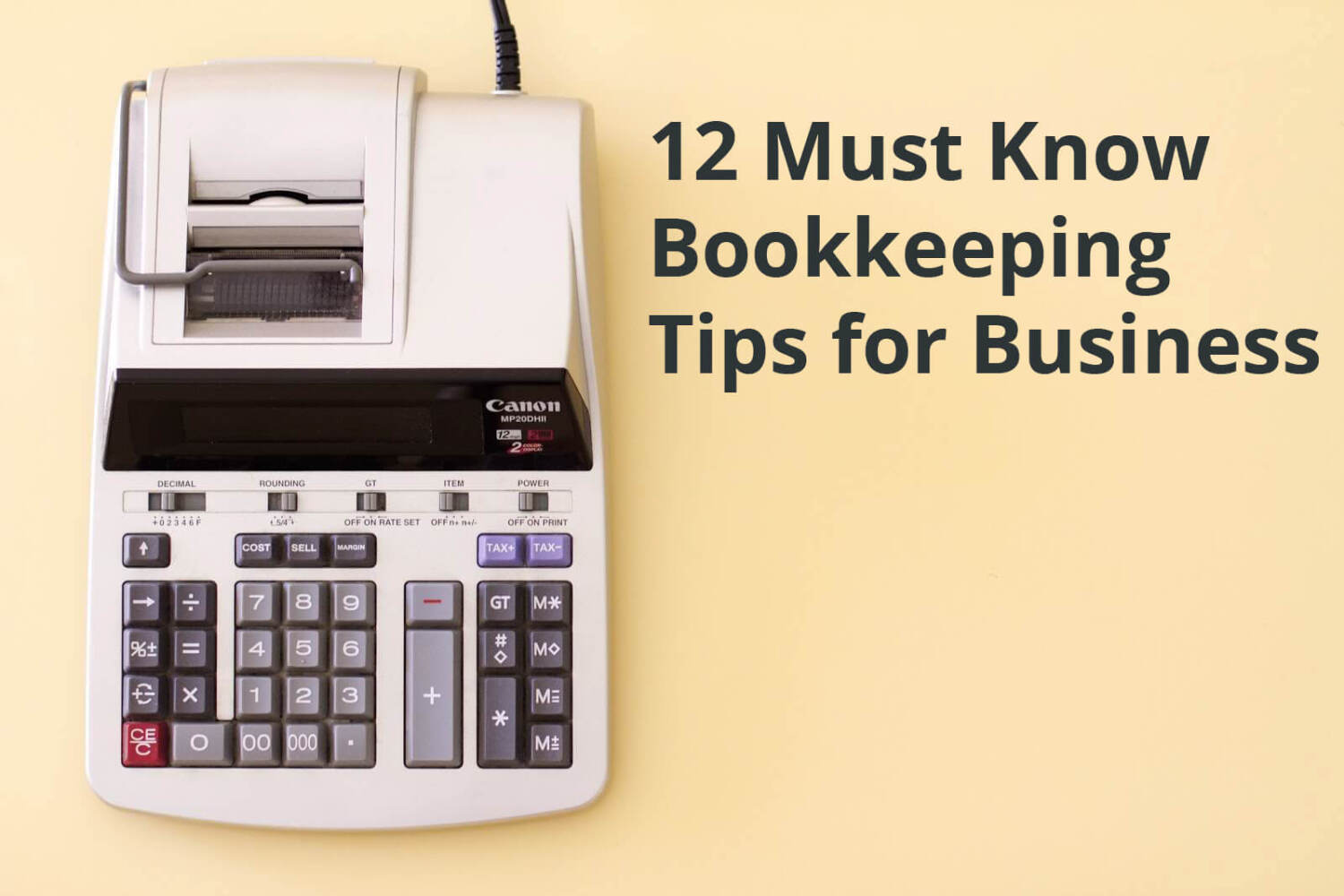12 Must Know Bookkeeping Tips for Businesses

As a business owner, you have a lot on your plate. From managing your day-to-day business operations, working with customers, marketing strategies, networking and keeping everything running smoothly. It’s tough to find time to sort through financial spreadsheets, analyse the numbers and manage your cash flow.
The reality is that managing your books, staying in control of your finances and making sure your business is compliant is vital for long term success.
So, before you spend another late night reviewing spreadsheets, here are 12 essential bookkeeping tips every business should know.
And if this is too much, you can always ask us for help! We're Melbourne Bookkeepers who can keep your business finances on track.
1. Keep Personal and Business Accounts Separate
Mixing your personal and business cash might not seem like a huge problem at first. However, every business should have a separate business bank account independent of any personal bank accounts. In many cases, a separate business bank account is compulsory, depending on your business structure.
This separate account will make it easier for you and your bookkeeper to sort through the purchases and sales relevant to your business and save you a lot of time, effort and headaches.
2. Automate with Cloud Based Accounting Software
We’re lucky to live in a time where cloud based accounting software gives you as the business owner the power to access your business information whenever you need it. Software integration technology has made it possible to sort through piles of paperwork each month, check spreadsheets, and perform manual calculations. Today, cloud based software does most of the hard work for you.
Accounting software [e.g. MYOB or Xero] can automatically send invoices to customers on the right due date, track your incoming and outgoing expenses, and generate reports on your cash flow. There are plenty of software options out there. The right choice for you will be the one that makes life easier for you, and if you’re not sure which option is correct, then you can always speak with a bookkeeping expert to get clear advice.

3. Create An Easy To Follow Record Keeping System
Every transaction your business makes should be recorded and organised in a way that’s easy for you to maintain and manage your cash flow. Keeping track of all business records, including invoices, receipts and expenses will help you predict future opportunities for your business and maintain tax compliance in the case of an audit.
While there are easy ways to digitise your paper receipts, if you prefer to keep paper records, these should remain in a locked and secure cabinet somewhere and be organised into a simple system. It’s also best to have a backup of your records just in case something goes missing.
Alternatively, most cloud-based bookkeeping software can store these documents for you by scanning receipts with your phone or forward electronic bills straight to your online bookkeeping system for reconciliation and record storage.
4. Set Reminders for Important Deadlines
You spend most of your time as a business owner running from one challenge to the next. With so much on your plate, it’s easy to lose track of when you should be paying GST, payroll, and regular business invoices. To avoid missing deadlines that could leave you with a fine or disgruntled partner, set reminders for yourself. You can do this with your email calendar online, or even your smartphone.
Even writing notes down for a few days before the deadlines can help keep you on track if you regularly check your physical calendar.
5. Build an Audit Trail
No matter how careful you are with your books, you could still end up with a tax audit on your hands. You must leave a trail of documentation that backs up everything you’ve purchased, and everything your customers have paid for.
An audit trail is essentially a selection of documents that prove the transactions recorded in your books are, in fact, true. Your audit trail will help you to retrace your steps if you have any issues with things like tax inaccuracies, source documents, or missing transactions.
6. Know Your Business Expenses
It’s difficult to predict what kind of expenses you’re going to tackle when you start running your business, and what kind of costs are deductible from your taxes. For instance, costs related to the company's operation and connected to your generation of income are tax-deductible. However, if you buy something that’s just for you – you can’t add that to your accounts.
Mixing business and personal accounts doesn’t mean that you can simply claim for everything you buy. You need to review and understand what’s claimable under Australian Tax Laws. If you’re not sure what counts as a deductible purchase, contact either an accounting professional or your local tax department.
7. Create Regular Reports
A good bookkeeping strategy isn’t just essential for tax purposes. Keeping track of your incoming and outgoing cash makes it easy to perform regular financial check-ups. With the right accounting software, you can ensure that all your customers pay their invoices on time and avoid any gaps in your reporting.
While it’s good to perform monthly check ups, you might want to take an in-depth look at your accounting and bookkeeping records at the end of each quarter, paying close attention to trends like declining or growing sales, large expenses, or evidence of late-paying customers. A proper evaluation of your numbers will help you to plan for a better cash flow in the future.
8. Track Cash Payments
It’s easy to forget about this when you first start building your business, but you need to record your cash payments too. Any cash received by the business needs to go into the business bank account before spending it – even on business products. It’s tempting to take the cash immediately to purchase supplies, but this can easily mess up your bookkeeping system.
When recording cash payments, remember to make a note of which customer paid, so you don’t chase them up again later. If you’re unsure how to manage the details of a cash payment on your accounting software, speak to a bookkeeper who can help you set it up and use it correctly.
9. Budget for Tax Payments
There are few things more wonderful than seeing that your business is making money. You might know that you’re starting to make a profit and decide to plough all your extra cash back into the company as soon as possible. Spending profit on product development, marketing, and other growth strategies is a great way to maintain your company’s momentum – but don’t rush in.
Remember that a portion of your income will need to go towards tax expenses at the end of the year. You should be saving at least a part of all your income – perhaps 20% - to ensure that you have enough money left to pay your bills. If you struggle to keep this money in your business account, use a separate savings account.
10. Know the Basics
Many business owners think that they don’t have to learn about tax and accounting rules if they have a professional to manage their books. You might even feel that way if you have an automated accounting software solution. However, while these assets reduce your risk of having problems with your taxes, it’s best to be informed about your tax obligations.
Go online and read everything you might need to know for the type of business you run. Remember that registered companies have different rules for sole traders and partnerships. Consider whether you’re paying corporation tax, registered for GST, and other regular fees. Having a basic insight into how taxes work could save you from some severe penalties.
11. Outsource to a Professional Bookkeeper
Cloud based accounting systems like Xero, Quickbooks and Reckon make it easier for business owners to handle their accounting without a lot of excess effort. However, that doesn’t mean you shouldn’t use a professional bookkeeper. Outsourcing to an experienced bookkeeper offers several benefits, including:
-
saving you valuable time
-
ensuring your books are always up to date and organised
-
save money
-
meeting all of your compliance activities including BAS and tax obligations
When your books are professionally organised with outsourced bookkeeping services, it is easy to decide on important business decisions as you have a clear picture of how your business is performing financially.

12. Make Your Books a Priority
Finally, tracking your expenses might not be the most exciting part of running your business, but it does need to be a priority. One mistake on a tax report or a poorly managed set of invoices in your bookkeeping records can throw your life into turmoil. From day one, make sure you have a strategy in place for keeping your books organised and up to date.
Although you don’t necessarily need to balance everything at the end of each working day, you should be sorting through your financial information at least once a month.
Commit to Better Bookkeeping
Whether you’re handling most of your accounting yourself or you’re hiring a professional to manage things for you, the right bookkeeping strategy is key. Follow the tips above, and you’ll have a better understanding of your business cash flow, fewer issues with tax, and more opportunities to grow.
